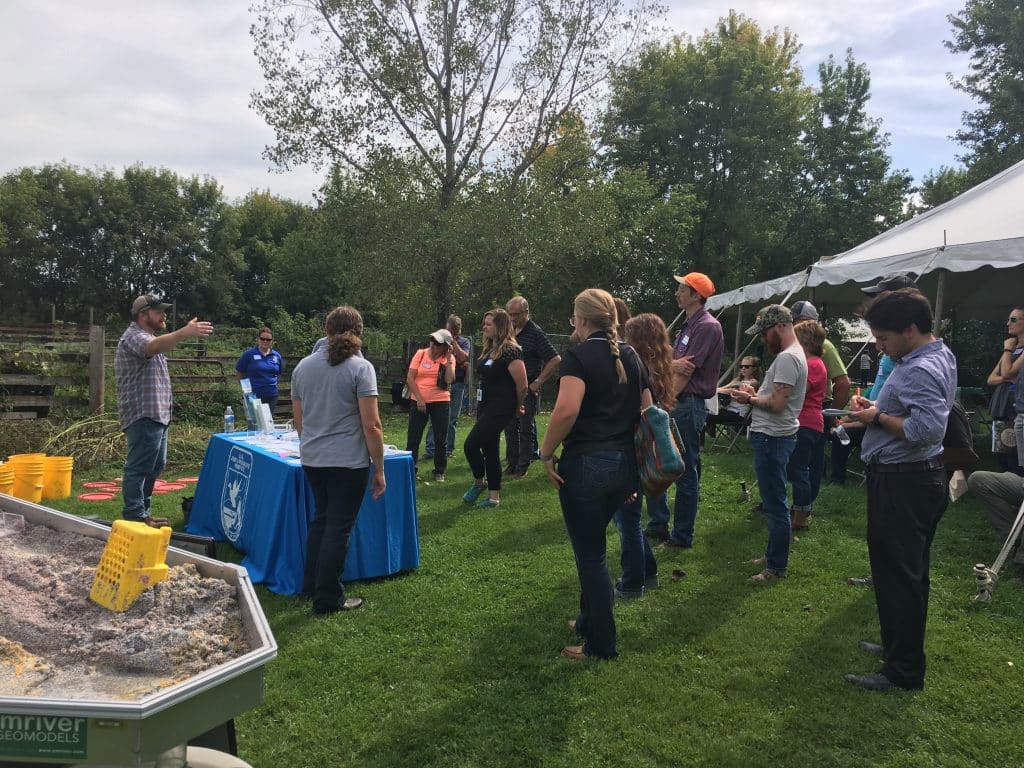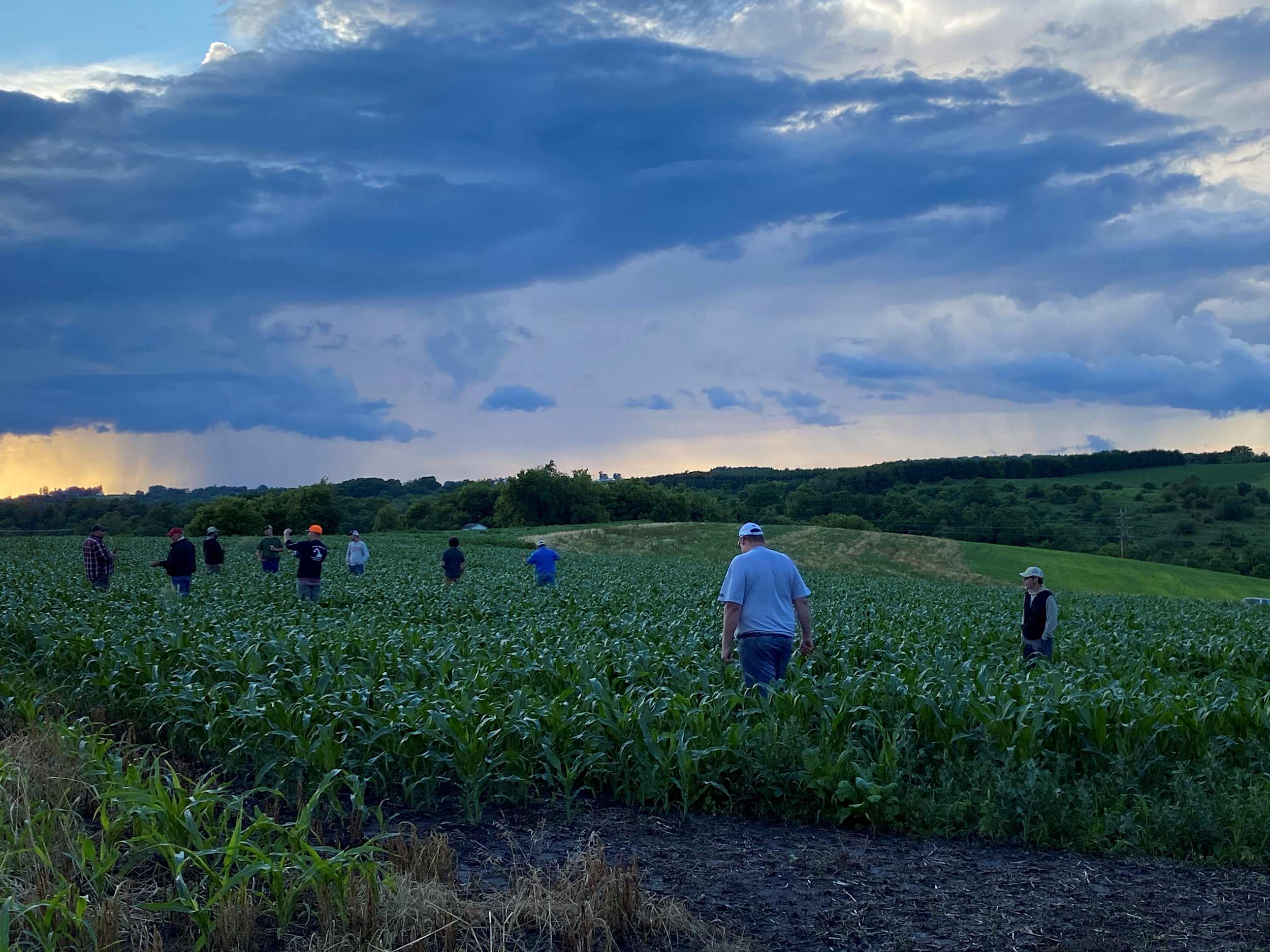Funding
We fund farmer-driven projects that
improve farms and fish habitat

What's New?

A River Runs Through It: Investing in the Future of the Upper Mississippi
Across the rolling farmland and winding streams of the Upper Mississippi River Basin, a quiet but powerful movement is taking root. The Fishers & Farmers Partnership (FFP) has announced a new investment of over $300,000 to support grassroots conservation efforts in five states—Wisconsin, Iowa, Minnesota, Illinois, and Missouri. These funds will fuel locally led projects that aim to improve soil health, protect water quality, and restore vital fish habitats.
Since 2009, FFP has worked hand-in-hand with farmers, conservationists, and community leaders to tackle the root causes of watershed degradation. This year’s projects reflect that same spirit of collaboration, blending science, communication, and community engagement to create lasting change.
Among the highlights: a dynamic workshop designed to spark new ideas and empower participants to take action in their own communities. It’s more than a meeting—it’s a space for dialogue, learning, and inspiration.
In Minnesota, Clean River Partners will work to protect the Little Cannon River trout fishery by securing conservation easements on private lands and supporting local farmers with tools to reduce sediment runoff. Meanwhile, in Illinois, American Farmland Trust is advancing farmer-led conservation in the Lower Illinois–Lake Chautauqua watershed, with a focus on engaging women and minority farmers.
At the heart of it all is a commitment to listening—to the land, to the science, and to the people who know these waters best. “These individuals are deeply committed to conserving soil and water resources, not just for today, but for future generations,” says Heidi Keuler, FFP Coordinator. “Our role is to support and elevate the work being done on the ground—this is the heart of what Fishers & Farmers is all about.”
Annual Funding Opportunities
Fishers & Farmers Partnership awards National Fish Habitat Partnership funding to locally-led projects in Upper Mississippi River Basin watersheds each year. Top ranked projects improve soil health on farms and fish habitat in streams by engaging and working with landowners to address root causes of watershed problems.
If you have a project in mind, we encourage you to reach out to a Fishers & Farmers Partnership steering committee member or our coordinator Heidi Keuler for an informal conversation. We want to help local groups to meet their goals and can advise about what makes an ideal project and how project are ranked.
Explore the past funded projects below to gain insight into the types of initiatives we support. These examples will inspire you to take action on your local project and help you understand our funding priorities.

Funded Projects
- 2026
- 2025
- 2024
- 2023
- 2022
- 2021
- 2020
- 2019
- 2018
- 2017
- 2016
- 2015
- 2014
- 2013
- 2012
- 2011
- Coordination & communication
- Dam removal
- Fish Passage
- Managed grazing
- Monitoring & data
- Nutrient retention
- Outreach & demonstrations
- Oxbow Restoration
- Peer-to-peer learning & mentoring
- Perennial cover & buffers
- Soil health & cover crops
- Stream & wetland restoration
- Water retention & sediment control
2025 | American Farmland Trust
American Farmland Trust is partnering with farmers to test and showcase conservation practices that protect water quality and fish habitat. Through hands-on demonstrations and outreach—especially with women and minority farmers—the project aims to reduce sediment and nutrient runoff while building stronger, more resilient farming communities.
2025 | Clean River Partners
Clean River Partners is expanding public fishing access and protecting trout habitat along the Little Cannon River in Minnesota. By securing conservation easements and supporting farmers with sustainable practices, the project reduces sediment runoff and strengthens long-term stream restoration.
2025 | FFP Workshop – Monticello, IL
These hands-on workshops are all about bringing people together—farmers, landowners, and local partners—to learn from each other and take action. They create space for honest conversations, shared experiences, and practical planning, so both farms and fish can thrive side by side.
2024 | Valley Stewardship Network – Coon Creek & Neighboring Watersheds
VSN has supported the Coon Creek Community Watershed Council by helping develop a 9 Key Element Watershed Plan and advancing farmer-led conservation efforts in the region. This work also includes leadership training, water quality monitoring, and expanded stewardship practices to protect Coon Creek and surrounding watersheds.
2024 | FFP Workshop – Galena, IL
Held in scenic Galena, Illinois, this workshop brought together watershed leaders, farmers, and conservationists for a transformative three-day experience. Through professional facilitation and immersive storytelling, participants explored regenerative agriculture, collaborative problem-solving, and the power of listening.
2023| Boone River Watershed
Leveraging state water quality initiative funds to increase Boone River Watershed oxbow restorations for Topeka Shiner and water quality.
2023| Conservation Drainage in Illinois
Conservation drainage practices have been a critical component of statewide efforts in Illinois.
2023| Devils Creek Watershed
A stark difference between the upper and lower part of the watershed forces this group to think outside the box and pursue two major approaches.
2023| Vermillion River Watershed
The Vermillion River project brings together MN DNR, FMR, and HAFA to restore a degraded metro trout stream through invasive removal, prairie and wetland restoration, scientific monitoring, and community engagement—creating a model for collaborative, watershed‑scale conservation.
2023| Huzzah/Shoal Creeks Woodlands for Wildlife
Using conservation marketing, an innovative approach being used in this geography, to engage landowners willing to adopt agricultural BMPs (Best Management Practices).
2022 | Boone River Watershed
Farmers, Boone River Watershed Partnership, The Nature Conservancy, Iowa Rivers Revival, Iowa Soybean Association and Wright SWCD are restoring oxbows to create Topeka shiner spawning habitat in Boone River watershed.
2022 | Seven Mile Creek Watershed
Farmers, Great River Greening and Nicollet SWCD are hosting field days, community events, demonstrations and discussions to advance cover crops, crop rotation and data collection showing results of conservation practices.
2022 | Le Sueur River Watershed
Farmers, UM-Mankato Water Resources Center and Waseca SWCD are advancing soil health and cover crop adoption in Le Sueur River Watershed including funds, mentoring and technical advice.
2022 | Soil Regeneration
Farmers, Izaak Walton League, agencies and ag service providers are advancing farming systems to restore soil health in Minnesota, including education, events, forums, interviews, workshops, tours and demonstration plots.
2022 | Bridge to Soil Health
Land Stewardship Project’s Bridge to Soil Health program is scaling-up the number of crop & livestock farmers who are restoring soil and talking publicly about resulting financial and environmental benefits.
2021 | Boone River Watershed
Farmers, Boone River Watershed Partnership, The Nature Conservancy, Iowa Rivers Revival, Iowa Soybean Association and Wright SWCD are restoring oxbows to create Topeka shiner spawning habitat in Boone River watershed.
2021 | Vermillion-Illinois Watersheds
Farmers, The Wetlands Initiative, NRCS, USFWS, National Fish & Wildlife Foundation, Illinois Corn Growers, University of Illinois, McKnight Foundation and others are advancing use of small tile-treatment wetlands on row-crop farms.
2021 | Cannon River Watershed
Farmers, Clean River Partners, Rice SWCD, St. Olaf College, MPCA, Minnesota DNR and McKnight Foundation are expanding cover cropping in Heath, Rice and Wolf Creek watersheds, including farmer-to-farmer and farmer-to-student learning.
2021 | Valley Stewardship Network – Kickapoo, Bad Axe Watersheds
Across Southwest Wisconsin, farmers and landowners are coming together to protect clean water, healthy soil, and thriving communities. Through farmer-led watershed councils, prairie plantings, and hands-on education, this growing movement is restoring the land—one field, one stream, and one conversation at a time.
2020 | Boone River Watershed
Farmers, Boone River Watershed Partnership, The Nature Conservancy, Iowa Rivers Revival, Iowa Soybean Association and Wright SWCD are restoring oxbows to create Topeka shiner spawning habitat in Boone River watershed.
2020 | Relay Cropping & Replicated Strip Trials
Farmers, Iowa Soybean Association and Northeast Iowa Resource Conservation & Development are implementing relay cropping and replicated strip trials to evaluate for yield and environmental impact, and facilitating dialogue among farmers.
2020 | Mower County Soil & Water Conservation District
Farmers, Mower SWCD, Minnesota Department of Agriculture, a consultant and others in Root River Field to Stream Partnership are demonstrating and communicating about Prairie Strips on 10-20 targeted sites.
2020 | Monroe County Land Conservation Department
Farmers, landowners, Monroe County Land Conservation and Trout Unlimited are innovating to monitor effectiveness of streambank restoration practices before and after storms, to enhance floodplains, flow regimes and connectivity.
2019 | Valley Stewardship Network – Tainter, West Fork, Bad Axe & Kickapoo Watersheds
New farmer-led watershed councils are forming across Southwest Wisconsin, empowering local land stewards to lead conservation efforts and improve water quality from the ground up.
2019 | Rice Creek & Cannon River Watersheds
Farmers are planting cover crops for 3 consecutive years and Clean River Partners, St. Olaf College and Minnesota DNR are coordinating, monitoring and conducting a fish count to show impacts.
2018 | Boone River Watershed
Boone River Watershed Partnership farmers, The Nature Conservancy, Kossuth and Wright SWCDs, Iowa Soybean Association and Iowa DNR are restoring stream oxbows to create habitat for endangered Topeka shiner minnows.
2018 | Tainter Creek Farmer Led Council – Tainter Creek
A collaborative effort between farmers, conservationists, and state agencies restored over a mile of Tainter Creek, reducing erosion, improving trout habitat, and inspiring community-led conservation across Wisconsin’s Driftless Area.
2018 | Rice Creek – Cannon River Watershed
Farmers are planting cover crops on 1,000 of 3,469 tillable acres in Rice Creek watershed for 3 consecutive years. Monitoring and a fish count will show impacts.
2017 | Rock Creek Watershed
Project partners are removing/modifying low head dams that inhibit fish movement, enhancing fish habitat and building stream crossings for farmland access to protect 32 fish species near Osage, IA.
2017 | Valley Stewardship Network – Kickapoo River Watershed
This project established Wisconsin’s first prairie STRIPS demonstration sites, reducing runoff and improving fish habitat while empowering farmers to lead conservation across 14 sites in the Kickapoo region.
2017 | Peno Creek Watershed
Missouri Department of Conservation, NRCS and others are providing technical and cost share assistance to Peno Creek Cooperative Partnership for watering systems, riparian corridor tree plantings, stream fencing and stream crossings.
2017 | Boone River Watershed
Boone River Watershed Partnership farmers, The Nature Conservancy, Kossuth and Wright SWCDs, Iowa Soybean Association and Iowa DNR are restoring stream oxbows to create habitat for endangered Topeka shiner minnows.
2017 | Shoal Creek Watershed
Farmers, Shoal Creek Woodlands for Wildlife Partnership and Ozark Land Trust are implementing a Marketing Action Plan to increase infiltration, improve stream channel habitat and reduce sediment and nutrient loading.
2017 | Jo Daviess County Soil & Water Health Coalition- Galena River Watershed
Building on extensive county-wide planning, Jo-Daviess Soil and Water Health Coalition farmers and local partners are hosting workshops and facilitated discussions to establish consensus and active participation in watershed restoration.
2016 | Spring Creek Watershed
Farmers and Missouri Department of Conservation are installing alternative water systems, riparian fencing and reinforced stream crossings, restoring riparian corridors, developing managed grazing plans and planting cover crops to improve fish habitat.
2016 | Root River Watershed
Root River Field to Stream Partnership farmers, MN Department of Agriculture, county agencies, TNC, MN Ag Water Resources Center and MN DNR are evaluating nutrient and sediment loss and conservation effectiveness with field-edge and in-stream monitoring.
2016 | Boone River Watershed
Boone River Watershed Partnership farmers, TNC, Kossuth and Wright County SWCDs, Iowa Soybean Association and Iowa DNR are restoring stream oxbow habitat for the endangered Topeka shiner minnow.
2016 | Hutchins Creek Watershed
Farmers, USFS, USFWS, Partners for Fish & Wildlife, Illinois Department of Agriculture and Union SWCD are stabilizing streambanks, constructing riparian buffers and enhancing habitat for fish and mussel species of concern.
2015 | Boone River Watershed
Farmers, Iowa DNR, The Nature Conservancy, Iowa Soybean Association and county SWCDs are restoring stream oxbows to reduce nutrient runoff and create habitat for the endangered Topeka shiner minnow.
2015 | Seven-Mile Creek Watershed
Seven Mile Creek Watershed Partnership (farmers, Great River Greening, Nicollet SWCD and NRCS) is installing water storage systems and bioreactors to reduce ravine erosion, sedimentation and nutrient runoff to the creek.
2014 | Peno Creek Watershed
Missouri Department of Conservation, NRCS and others are providing technical and cost share assistance to Peno Creek Cooperative Partnership for watering systems, riparian corridor tree plantings, stream fencing and stream crossings.
2014 | Big Muddy Wetlands
Landowners and US Forest Service are enhancing wetlands in swale and ridge topography and increasing water holding capability in an oxbow lake/button bush marsh along Big Muddy River.
2014 | Rice Creek Watershed
Clean River Partners is facilitating three farmer-led projects (installation of two water management drainage structures, 300 acres strip-till, 200 acres cover crops) with integrated on-farm demos, meetings, tours and research.
2014 | Mississippi Valley Conservancy – Kickapoo River Watershed
Multiple partners turned watershed data into action—engaging landowners, restoring habitat, and protecting over 14,000 acres in this Wisconsin watershed through sustainable, community-led conservation.
2014 | Rock Creek Watershed
Iowa DNR and NRCS are working with a farmer to remove a low-head dam inhibiting fish movement, opening approximately five miles of stream habitat to fish.
2013 | Engaging Landowners Workshops
Missouri Department of Conservation is leading landowner engagement workshops for federal/state/county/NGO staff in a five-state area.
2013 | Boone River Watershed
Farmers, Iowa DNR, The Nature Conservancy, Iowa Soybean Association and county SWCDs are restoring stream oxbows to reduce nutrient runoff and create habitat for the endangered Topeka shiner minnow.
2013 | Bourbeuse / Meramec River Watershed
Farmers and Missouri Department of Conservation are implementing managed grazing to add value to farms and reduce sedimentation, nutrient loading & streambank instability.
2012 | Rush/Pine Watershed
A 40-member farmer-led council, two sub-watershed groups, and cover crop program are addressing water quality and fish habitat issues.
2012 | Seven-Mile Creek Watershed
Farmers, Nicollet Soil & Water Conservation District, NRCS, Great River Greening and Minnesota DNR are installing sediment control structures and other practices to reduce ravine erosion, sedimentation and nutrient loss.
2011 | Boone River Watershed
Farmers, Iowa DNR, The Nature Conservancy, Iowa Soybean Association and county SWCDs are restoring stream oxbows to reduce nutrient runoff and create habitat for the endangered Topeka shiner minnow.
Boone River Watershed
The Boone River Watershed is a decade‑long conservation success story, where partners have restored more than 60 oxbows, improved water quality, and boosted habitat for the endangered Topeka Shiner. With strong collaboration and national recognition, the project has become a proven model for watershed restoration—one that continues to grow with hundreds of sites still ahead.
Rock Creek Watershed
In Mitchell County, Iowa, partners restored over 10 miles of stream habitat by removing a low‑head dam that had long blocked fish movement. Led by Iowa DNR, Mitchell County Conservation, and a dedicated landowner, the project improved water quality, reconnected fish passage, and boosted species diversity. The restored stream now supports healthier aquatic life and provides clearer water, more wildlife, and better recreation—showcasing the power of collaboration between agencies and local landowners.

